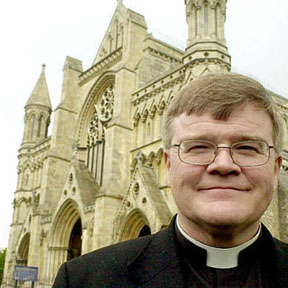Leading Gay Cleric Jeffrey John Narrowly Rejected As Bishop In Wales
A leading gay cleric has narrowly missed out on becoming a bishop after his appointment was rejected for the fourth time.
Very Rev Jeffrey John, who has twice been turned down for senior roles over his sexuality, was in the running to be Bishop of Llandaff, Christian Today understands.
But despite winning support from more than half of the nominating body, he just missed on the two-thirds majority required.
Christian Today understands Dr John's long-term civil partnership with Grant Holmes, another Anglican priest, was a factor in his rejection by traditionalists.

After three days of discussions the electoral body of 47 people, made up of locals from the diocese, bishops and the official nomination committee, failed to agree on any candidate. The final decision will now be down to senior bishops despite Dr John winning strong support among electors in the mainly Anglo-Catholic region of Llandaff.
Neither the Church in Wales nor the Church of England are opposed to clergy being in civil partnerships. The Church of England requests that clergy in civil partnerships vow to remain sexually chaste, but the Church in Wales has no such restriction.
Currently Dean of St Albans, Dr John was previously nominated to be Bishop of Reading in 2003 but was forced to withdraw himself under intense pressure from traditionalists.
He was later in the running for Bishop of Bangor in 2008 and then again for Bishop of Southwark in 2010 but was both times turned down with conservatives threatening a split in the Church.
But Dr John's latest rejection to be Bishop of Llandaff is particularly striking because of the strong support he received among local clergy and parishioners in the largely liberal diocese.
It comes after the recently retired Archbishop of Wales used his final address to urge the Church to rethink its stance on LGBT couples.
Dr Barry Morgan said supporting gay marriage did not mean 'abandoning the Bible' and that gay sex was perfectly 'proper'.
He said typical texts used to condemn homosexuality could be 'interpreted in more than one way' and read as a whole it is impossible to say there is 'one settled understanding of what the Bible says'.
He said: 'What all this amounts to is that one cannot argue that there is one accepted traditional way of interpreting scripture that is true and orthodox and all else is modern revisionism, culturally conditioned...so taking the Bible as a whole and taking what it says very seriously may lead us into a very different view of same-sex relationships than the one traditionally upheld by the Church.'
He went on: 'We are not thereby abandoning the Bible but trying to interpret it in a way that is consistent with the main thrust of the ministry of Jesus, who went out of His way to minister to those who were excluded, marginalised, and abandoned by his society because they were regarded as impure and unholy by the religious leaders of his day, either because of their gender, age, morality or sexuality.'
Dr Morgan's address came after the Church in Wales has apologised unreservedly for its mistreatment of gay and lesbian people and strongly indicated it could allow or bless same-sex marriages in the future.











